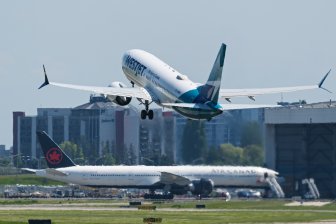The governments of British Columbia, Ontario and Newfoundland and Labrador lost up to $2.47 billion in tax revenues over four years due to the growth in illegal tobacco sales, says a convenience industry report.

The Convenience Industry Council of Canada report released Wednesday examined the downward trend in legal tobacco sales in the three provinces since 2019, compared with the rising growth in the underground contraband tobacco market.
“These cigarettes are illegally sold, tax and duty free, without any Health Canada regulations or inspections and retail for a fraction of legal tobacco prices,” said the 72-page report.
The report said there are more profits in selling illegal cigarettes than illicit drugs, yet the penalties for getting caught with the cigarettes are less harsh.

It estimated B.C. lost between $215 million and $591 million in tobacco tax revenue to the illegal sales between 2019 and 2022.
In Ontario, the loss for the same time period was valued between $990 million and $1.8 billion, and between $25 million and $81 million in Newfoundland, the report said, which suggested the losses could be similar for the other provinces not included in the review.
Illegal cigarette sales could comprise up to 67 per cent of Ontario’s total tobacco market, 45 per cent in B.C. and 44 per cent in Newfoundland.
The convenience industry report made five recommendations, including calling for tougher federal and provincial penalties for illegal tobacco trafficking, increasing police resources to combat contraband tobacco and making the issue a top priority of federal and provincial justice officials.

The Convenience Industry Council of Canada is a not-for-profit organization representing the interests of the $54-billion a year industry at federal, provincial and municipal levels.
“In an effort to reduce smoking rates, federal and provincial governments have increased taxes on legal tobacco products,” said the report. “The result? Many smokers have sought cheaper tobacco on the illicit market instead.”
The report said the contraband tobacco market in Canada has also continued to expand due to “a confusing legal framework” surrounding the manufacturing and sale of cigarettes on First Nations reserves.
“Organized crime groups exploit this demand with low-cost cigarettes manufactured on reserve, and then traffic these products to non-status individuals,” said the report.

The British Columbia Ministry of Finance has previously said in a statement the provincial Tobacco Tax Act includes stiff penalties for dealing in illegal tobacco.
B.C. strictly regulates the sale, purchase, possession and transportation of tobacco, and the province has taken steps to combat the sale and use of contraband products, said the ministry.
It said B.C. generated $708 million in tobacco tax revenue in 2021-2022 and $711 million in 2020-2021.
Since 2019, legal tobacco sales in Newfoundland and Labrador have fallen 49.5 per cent, they’re down 33 per cent in B.C. and the figures have dropped 20.2 per cent in Ontario, the report said.
“The major driver of the explosive growth of illegal cigarettes in Canada: the significant price difference between tax-paid legal cigarettes and contraband cigarettes,” said the report. “Contraband cigarettes may be purchased for only about 40 per cent of the price of legal, tax-paid cigarettes.”
A legal carton of 200 cigarettes in B.C. will cost about $155, but the same amount of contraband tobacco will sell for between $30 and $50, said the report.
Individual packages of 20 legal cigarettes in B.C. sell for between $15 and $21, but can be bought on the contraband market for between $5 and $7.
“It is illegal for non-reserve residents or individuals that are not First Nations to purchase tax-free, First Nations produced tobacco products,” said the report.
Taxes amount to about 70 per cent of the retail price of cigarettes in Canada, the report said.



Comments